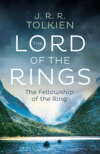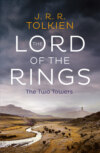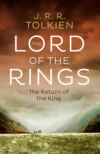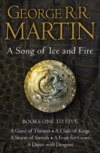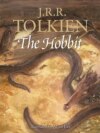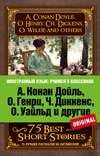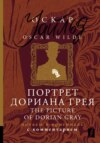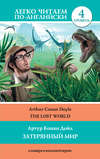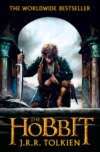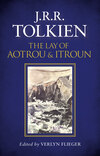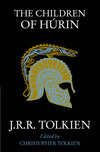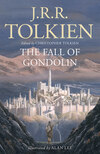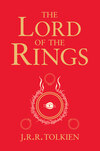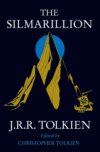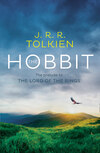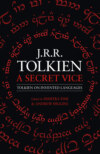Kitabı oku: «The Fellowship of the Ring», sayfa 7
‘Ever since Bilbo left I have been deeply concerned about you, and about all these charming, absurd, helpless hobbits. It would be a grievous blow to the world, if the Dark Power overcame the Shire; if all your kind, jolly, stupid Bolgers, Hornblowers, Boffins, Bracegirdles, and the rest, not to mention the ridiculous Bagginses, became enslaved.’
Frodo shuddered. ‘But why should we be?’ he asked. ‘And why should he want such slaves?’
‘To tell you the truth,’ replied Gandalf, ‘I believe that hitherto – hitherto, mark you – he has entirely overlooked the existence of hobbits. You should be thankful. But your safety has passed. He does not need you – he has many more useful servants – but he won’t forget you again. And hobbits as miserable slaves would please him far more than hobbits happy and free. There is such a thing as malice and revenge.’
‘Revenge?’ said Frodo. ‘Revenge for what? I still don’t understand what all this has to do with Bilbo and myself, and our ring.’
‘It has everything to do with it,’ said Gandalf. ‘You do not know the real peril yet; but you shall. I was not sure of it myself when I was last here; but the time has come to speak. Give me the ring for a moment.’
Frodo took it from his breeches-pocket, where it was clasped to a chain that hung from his belt. He unfastened it and handed it slowly to the wizard. It felt suddenly very heavy, as if either it or Frodo himself was in some way reluctant for Gandalf to touch it.
Gandalf held it up. It looked to be made of pure and solid gold. ‘Can you see any markings on it?’ he asked.
‘No,’ said Frodo. ‘There are none. It is quite plain, and it never shows a scratch or sign of wear.’
‘Well then, look!’ To Frodo’s astonishment and distress the wizard threw it suddenly into the middle of a glowing corner of the fire. Frodo gave a cry and groped for the tongs; but Gandalf held him back.
‘Wait!’ he said in a commanding voice, giving Frodo a quick look from under his bristling brows.
No apparent change came over the ring. After a while Gandalf got up, closed the shutters outside the window, and drew the curtains. The room became dark and silent, though the clack of Sam’s shears, now nearer to the windows, could still be heard faintly from the garden. For a moment the wizard stood looking at the fire; then he stooped and removed the ring to the hearth with the tongs, and at once picked it up. Frodo gasped.
‘It is quite cool,’ said Gandalf. ‘Take it!’ Frodo received it on his shrinking palm: it seemed to have become thicker and heavier than ever.
‘Hold it up!’ said Gandalf. ‘And look closely!’
As Frodo did so, he now saw fine lines, finer than the finest pen-strokes, running along the ring, outside and inside: lines of fire that seemed to form the letters of a flowing script. They shone piercingly bright, and yet remote, as if out of a great depth.

‘I cannot read the fiery letters,’ said Frodo in a quavering voice.
‘No,’ said Gandalf, ‘but I can. The letters are Elvish, of an ancient mode, but the language is that of Mordor, which I will not utter here. But this in the Common Tongue is what is said, close enough:
One Ring to rule them all, One Ring to find them,
One Ring to bring them all and in the darkness bind them.
It is only two lines of a verse long known in Elven-lore:
Three Rings for the Elven-kings under the sky,
Seven for the Dwarf-lords in their halls of stone,
Nine for Mortal Men doomed to die,
One for the Dark Lord on his dark throne
In the Land of Mordor where the Shadows lie.
One Ring to rule them all, One Ring to find them,
One Ring to bring them all and in the darkness bind them
In the Land of Mordor where the Shadows lie.’
He paused, and then said slowly in a deep voice: ‘This is the Master-ring, the One Ring to rule them all. This is the One Ring that he lost many ages ago, to the great weakening of his power. He greatly desires it – but he must not get it.’
Frodo sat silent and motionless. Fear seemed to stretch out a vast hand, like a dark cloud rising in the East and looming up to engulf him. ‘This ring!’ he stammered. ‘How, how on earth did it come to me?’
‘Ah!’ said Gandalf. ‘That is a very long story. The beginnings lie back in the Black Years, which only the lore-masters now remember. If I were to tell you all that tale, we should still be sitting here when Spring had passed into Winter.
‘But last night I told you of Sauron the Great, the Dark Lord. The rumours that you have heard are true: he has indeed arisen again and left his hold in Mirkwood and returned to his ancient fastness in the Dark Tower of Mordor. That name even you hobbits have heard of, like a shadow on the borders of old stories. Always after a defeat and a respite, the Shadow takes another shape and grows again.’
‘I wish it need not have happened in my time,’ said Frodo.
‘So do I,’ said Gandalf, ‘and so do all who live to see such times. But that is not for them to decide. All we have to decide is what to do with the time that is given us. And already, Frodo, our time is beginning to look black. The Enemy is fast becoming very strong. His plans are far from ripe, I think, but they are ripening. We shall be hard put to it. We should be very hard put to it, even if it were not for this dreadful chance.
‘The Enemy still lacks one thing to give him strength and knowledge to beat down all resistance, break the last defences, and cover all the lands in a second darkness. He lacks the One Ring.
‘The Three, fairest of all, the Elf-lords hid from him, and his hand never touched them or sullied them. Seven the Dwarf-kings possessed, but three he has recovered, and the others the dragons have consumed. Nine he gave to Mortal Men, proud and great, and so ensnared them. Long ago they fell under the dominion of the One, and they became Ringwraiths, shadows under his great Shadow, his most terrible servants. Long ago. It is many a year since the Nine walked abroad. Yet who knows? As the Shadow grows once more, they too may walk again. But come! We will not speak of such things even in the morning of the Shire.
‘So it is now: the Nine he has gathered to himself; the Seven also, or else they are destroyed. The Three are hidden still. But that no longer troubles him. He only needs the One; for he made that Ring himself, it is his, and he let a great part of his own former power pass into it, so that he could rule all the others. If he recovers it, then he will command them all again, wherever they be, even the Three, and all that has been wrought with them will be laid bare, and he will be stronger than ever.
‘And this is the dreadful chance, Frodo. He believed that the One had perished; that the Elves had destroyed it, as should have been done. But he knows now that it has not perished, that it has been found. So he is seeking it, seeking it, and all his thought is bent on it. It is his great hope and our great fear.’
‘Why, why wasn’t it destroyed?’ cried Frodo. ‘And how did the Enemy ever come to lose it, if he was so strong, and it was so precious to him?’ He clutched the Ring in his hand, as if he saw already dark fingers stretching out to seize it.
‘It was taken from him,’ said Gandalf. ‘The strength of the Elves to resist him was greater long ago; and not all Men were estranged from them. The Men of Westernesse came to their aid. That is a chapter of ancient history which it might be good to recall; for there was sorrow then too, and gathering dark, but great valour, and great deeds that were not wholly vain. One day, perhaps, I will tell you all the tale, or you shall hear it told in full by one who knows it best.
‘But for the moment, since most of all you need to know how this thing came to you, and that will be tale enough, this is all that I will say. It was Gil-galad, Elven-king and Elendil of Westernesse who overthrew Sauron, though they themselves perished in the deed; and Isildur Elendil’s son cut the Ring from Sauron’s hand and took it for his own. Then Sauron was vanquished and his spirit fled and was hidden for long years, until his shadow took shape again in Mirkwood.
‘But the Ring was lost. It fell into the Great River, Anduin, and vanished. For Isildur was marching north along the east banks of the River, and near the Gladden Fields he was waylaid by the Orcs of the Mountains, and almost all his folk were slain. He leaped into the waters, but the Ring slipped from his finger as he swam, and then the Orcs saw him and killed him with arrows.’
Gandalf paused. ‘And there in the dark pools amid the Gladden Fields,’ he said, ‘the Ring passed out of knowledge and legend; and even so much of its history is known now only to a few, and the Council of the Wise could discover no more. But at last I can carry on the story, I think.
‘Long after, but still very long ago, there lived by the banks of the Great River on the edge of Wilderland a clever-handed and quiet-footed little people. I guess they were of hobbit-kind; akin to the fathers of the fathers of the Stoors, for they loved the River, and often swam in it, or made little boats of reeds. There was among them a family of high repute, for it was large and wealthier than most, and it was ruled by a grandmother of the folk, stern and wise in old lore, such as they had. The most inquisitive and curious-minded of that family was called Sméagol. He was interested in roots and beginnings; he dived into deep pools; he burrowed under trees and growing plants; he tunnelled into green mounds; and he ceased to look up at the hill-tops, or the leaves on trees, or the flowers opening in the air: his head and his eyes were downward.
‘He had a friend called Déagol, of similar sort, sharper-eyed but not so quick and strong. On a time they took a boat and went down to the Gladden Fields, where there were great beds of iris and flowering reeds. There Sméagol got out and went nosing about the banks but Déagol sat in the boat and fished. Suddenly a great fish took his hook, and before he knew where he was, he was dragged out and down into the water, to the bottom. Then he let go of his line, for he thought he saw something shining in the river-bed; and holding his breath he grabbed at it.
‘Then up he came spluttering, with weeds in his hair and a handful of mud; and he swam to the bank. And behold! when he washed the mud away, there in his hand lay a beautiful golden ring; and it shone and glittered in the sun, so that his heart was glad. But Sméagol had been watching him from behind a tree, and as Déagol gloated over the ring, Sméagol came softly up behind.
‘ “Give us that, Déagol, my love,” said Sméagol, over his friend’s shoulder.
‘ “Why?” said Déagol.
‘ “Because it’s my birthday, my love, and I wants it,” said Sméagol.
‘ “I don’t care,” said Déagol. “I have given you a present already, more than I could afford. I found this, and I’m going to keep it.”
‘ “Oh, are you indeed, my love,” said Sméagol; and he caught Déagol by the throat and strangled him, because the gold looked so bright and beautiful. Then he put the ring on his finger.
‘No one ever found out what had become of Déagol; he was murdered far from home, and his body was cunningly hidden. But Sméagol returned alone; and he found that none of his family could see him, when he was wearing the ring. He was very pleased with his discovery and he concealed it; and he used it to find out secrets, and he put his knowledge to crooked and malicious uses. He became sharp-eyed and keen-eared for all that was hurtful. The ring had given him power according to his stature. It is not to be wondered at that he became very unpopular and was shunned (when visible) by all his relations. They kicked him, and he bit their feet. He took to thieving, and going about muttering to himself, and gurgling in his throat. So they called him Gollum, and cursed him, and told him to go far away; and his grandmother, desiring peace, expelled him from the family and turned him out of her hole.
‘He wandered in loneliness, weeping a little for the hardness of the world, and he journeyed up the River, till he came to a stream that flowed down from the mountains, and he went that way. He caught fish in deep pools with invisible fingers and ate them raw. One day it was very hot, and as he was bending over a pool, he felt a burning on the back of his head, and a dazzling light from the water pained his wet eyes. He wondered at it, for he had almost forgotten about the Sun. Then for the last time he looked up and shook his fist at her.
‘But as he lowered his eyes, he saw far ahead the tops of the Misty Mountains, out of which the stream came. And he thought suddenly: “It would be cool and shady under those mountains. The Sun could not watch me there. The roots of those mountains must be roots indeed; there must be great secrets buried there which have not been discovered since the beginning.”
‘So he journeyed by night up into the highlands, and he found a little cave out of which the dark stream ran; and he wormed his way like a maggot into the heart of the hills, and vanished out of all knowledge. The Ring went into the shadows with him, and even the maker, when his power had begun to grow again, could learn nothing of it.’
‘Gollum!’ cried Frodo. ‘Gollum? Do you mean that this is the very Gollum-creature that Bilbo met? How loathsome!’
‘I think it is a sad story,’ said the wizard, ‘and it might have happened to others, even to some hobbits that I have known.’
‘I can’t believe that Gollum was connected with hobbits, however distantly,’ said Frodo with some heat. ‘What an abominable notion!’
‘It is true all the same,’ replied Gandalf. ‘About their origins, at any rate, I know more than hobbits do themselves. And even Bilbo’s story suggests the kinship. There was a great deal in the background of their minds and memories that was very similar. They understood one another remarkably well, very much better than a hobbit would understand, say, a Dwarf, or an Orc, or even an Elf. Think of the riddles they both knew, for one thing.’
‘Yes,’ said Frodo. ‘Though other folks besides hobbits ask riddles, and of much the same sort. And hobbits don’t cheat. Gollum meant to cheat all the time. He was just trying to put poor Bilbo off his guard. And I daresay it amused his wickedness to start a game which might end in providing him with an easy victim, but if he lost would not hurt him.’
‘Only too true, I fear,’ said Gandalf. ‘But there was something else in it, I think, which you don’t see yet. Even Gollum was not wholly ruined. He had proved tougher than even one of the Wise would have guessed – as a hobbit might. There was a little corner of his mind that was still his own, and light came through it, as through a chink in the dark: light out of the past. It was actually pleasant, I think, to hear a kindly voice again, bringing up memories of wind, and trees, and sun on the grass, and such forgotten things.
‘But that, of course, would only make the evil part of him angrier in the end – unless it could be conquered. Unless it could be cured.’ Gandalf sighed. ‘Alas! there is little hope of that for him. Yet not no hope. No, not though he possessed the Ring so long, almost as far back as he can remember. For it was long since he had worn it much: in the black darkness it was seldom needed. Certainly he had never “faded”. He is thin and tough still. But the thing was eating up his mind, of course, and the torment had become almost unbearable.
‘All the “great secrets” under the mountains had turned out to be just empty night: there was nothing more to find out, nothing worth doing, only nasty furtive eating and resentful remembering. He was altogether wretched. He hated the dark, and he hated light more: he hated everything, and the Ring most of all.’
‘What do you mean?’ said Frodo. ‘Surely the Ring was his Precious and the only thing he cared for? But if he hated it, why didn’t he get rid of it, or go away and leave it?’
‘You ought to begin to understand, Frodo, after all you have heard,’ said Gandalf. ‘He hated it and loved it, as he hated and loved himself. He could not get rid of it. He had no will left in the matter.
‘A Ring of Power looks after itself, Frodo. It may slip off treacherously, but its keeper never abandons it. At most he plays with the idea of handing it on to someone else’s care – and that only at an early stage, when it first begins to grip. But as far as I know Bilbo alone in history has ever gone beyond playing, and really done it. He needed all my help, too. And even so he would never have just forsaken it, or cast it aside. It was not Gollum, Frodo, but the Ring itself that decided things. The Ring left him.’
‘What, just in time to meet Bilbo?’ said Frodo. ‘Wouldn’t an Orc have suited it better?’
‘It is no laughing matter,’ said Gandalf. ‘Not for you. It was the strangest event in the whole history of the Ring so far: Bilbo’s arrival just at that time, and putting his hand on it, blindly, in the dark.
‘There was more than one power at work, Frodo. The Ring was trying to get back to its master. It had slipped from Isildur’s hand and betrayed him; then when a chance came it caught poor Déagol, and he was murdered; and after that Gollum, and it had devoured him. It could make no further use of him: he was too small and mean; and as long as it stayed with him he would never leave his deep pool again. So now, when its master was awake once more and sending out his dark thought from Mirkwood, it abandoned Gollum. Only to be picked up by the most unlikely person imaginable: Bilbo from the Shire!
‘Behind that there was something else at work, beyond any design of the Ring-maker. I can put it no plainer than by saying that Bilbo was meant to find the Ring, and not by its maker. In which case you also were meant to have it. And that may be an encouraging thought.’
‘It is not,’ said Frodo. ‘Though I am not sure that I understand you. But how have you learned all this about the Ring, and about Gollum? Do you really know it all, or are you just guessing still?’
Gandalf looked at Frodo, and his eyes glinted. ‘I knew much and I have learned much,’ he answered. ‘But I am not going to give an account of all my doings to you. The history of Elendil and Isildur and the One Ring is known to all the Wise. Your ring is shown to be that One Ring by the fire-writing alone, apart from any other evidence.’
‘And when did you discover that?’ asked Frodo, interrupting.
‘Just now in this room, of course,’ answered the wizard sharply. ‘But I expected to find it. I have come back from dark journeys and long search to make that final test. It is the last proof, and all is now only too clear. Making out Gollum’s part, and fitting it into the gap in the history, required some thought. I may have started with guesses about Gollum, but I am not guessing now. I know. I have seen him.’
‘You have seen Gollum?’ exclaimed Frodo in amazement.
‘Yes. The obvious thing to do, of course, if one could. I tried long ago; but I have managed it at last.’
‘Then what happened after Bilbo escaped from him? Do you know that?’
‘Not so clearly. What I have told you is what Gollum was willing to tell – though not, of course, in the way I have reported it. Gollum is a liar, and you have to sift his words. For instance, he called the Ring his “birthday-present”, and he stuck to that. He said it came from his grandmother, who had lots of beautiful things of that kind. A ridiculous story. I have no doubt that Sméagol’s grandmother was a matriarch, a great person in her way, but to talk of her possessing many Elven-rings was absurd, and as for giving them away, it was a lie. But a lie with a grain of truth.
‘The murder of Déagol haunted Gollum, and he had made up a defence, repeating it to his “Precious” over and over again, as he gnawed bones in the dark, until he almost believed it. It was his birthday. Déagol ought to have given the ring to him. It had obviously turned up just so as to be a present. It was his birthday-present, and so on, and on.
‘I endured him as long as I could, but the truth was desperately important, and in the end I had to be harsh. I put the fear of fire on him, and wrung the true story out of him, bit by bit, together with much snivelling and snarling. He thought he was misunderstood and ill-used. But when he had at last told me his history, as far as the end of the Riddle-game and Bilbo’s escape, he would not say any more, except in dark hints. Some other fear was on him greater than mine. He muttered that he was going to get his own back. People would see if he would stand being kicked, and driven into a hole and then robbed. Gollum had good friends now, good friends and very strong. They would help him. Baggins would pay for it. That was his chief thought. He hated Bilbo and cursed his name. What is more, he knew where he came from.’
‘But how did he find that out?’ asked Frodo.
‘Well, as for the name, Bilbo very foolishly told Gollum himself; and after that it would not be difficult to discover his country, once Gollum came out. Oh yes, he came out. His longing for the Ring proved stronger than his fear of the Orcs, or even of the light. After a year or two he left the mountains. You see, though still bound by desire of it, the Ring was no longer devouring him; he began to revive a little. He felt old, terribly old, yet less timid, and he was mortally hungry.
‘Light, light of Sun and Moon, he still feared and hated, and he always will, I think; but he was cunning. He found he could hide from daylight and moonshine, and make his way swiftly and softly by dead of night with his pale cold eyes, and catch small frightened or unwary things. He grew stronger and bolder with new food and new air. He found his way into Mirkwood, as one would expect.’
‘Is that where you found him?’ asked Frodo.
‘I saw him there,’ answered Gandalf, ‘but before that he had wandered far, following Bilbo’s trail. It was difficult to learn anything from him for certain, for his talk was constantly interrupted by curses and threats. “What had it got in its pocketses?” he said. “It wouldn’t say, no precious. Little cheat. Not a fair question. It cheated first, it did. It broke the rules. We ought to have squeezed it, yes precious. And we will, precious!”
‘That is a sample of his talk. I don’t suppose you want any more. I had weary days of it. But from hints dropped among the snarls I gathered that his padding feet had taken him at last to Esgaroth, and even to the streets of Dale, listening secretly and peering. Well, the news of the great events went far and wide in Wilderland, and many had heard Bilbo’s name and knew where he came from. We had made no secret of our return journey to his home in the West. Gollum’s sharp ears would soon learn what he wanted.’
‘Then why didn’t he track Bilbo further?’ asked Frodo. ‘Why didn’t he come to the Shire?’
‘Ah,’ said Gandalf, ‘now we come to it. I think Gollum tried to. He set out and came back westward, as far as the Great River. But then he turned aside. He was not daunted by the distance, I am sure. No, something else drew him away. So my friends think, those that hunted him for me.
‘The Wood-elves tracked him first, an easy task for them, for his trail was still fresh then. Through Mirkwood and back again it led them, though they never caught him. The wood was full of the rumour of him, dreadful tales even among beasts and birds. The Woodmen said that there was some new terror abroad, a ghost that drank blood. It climbed trees to find nests; it crept into holes to find the young; it slipped through windows to find cradles.
‘But at the western edge of Mirkwood the trail turned away. It wandered off southwards and passed out of the Wood-elves’ ken, and was lost. And then I made a great mistake. Yes, Frodo, and not the first; though I fear it may prove the worst. I let the matter be. I let him go; for I had much else to think of at that time, and I still trusted the lore of Saruman.
‘Well, that was years ago. I have paid for it since with many dark and dangerous days. The trail was long cold when I took it up again, after Bilbo left here. And my search would have been in vain, but for the help that I had from a friend: Aragorn, the greatest traveller and huntsman of this age of the world. Together we sought for Gollum down the whole length of Wilderland, without hope, and without success. But at last, when I had given up the chase and turned to other paths, Gollum was found. My friend returned out of great perils bringing the miserable creature with him.
‘What he had been doing he would not say. He only wept and called us cruel, with many a gollum in his throat; and when we pressed him he whined and cringed, and rubbed his long hands, licking his fingers as if they pained him, as if he remembered some old torture. But I am afraid there is no possible doubt: he had made his slow, sneaking way, step by step, mile by mile, south, down at last to the Land of Mordor.’
A heavy silence fell in the room. Frodo could hear his heart beating. Even outside everything seemed still. No sound of Sam’s shears could now be heard.
‘Yes, to Mordor,’ said Gandalf. ‘Alas! Mordor draws all wicked things, and the Dark Power was bending all its will to gather them there. The Ring of the Enemy would leave its mark, too, leave him open to the summons. And all folk were whispering then of the new Shadow in the South, and its hatred of the West. There were his fine new friends, who would help him in his revenge!
‘Wretched fool! In that land he would learn much, too much for his comfort. And sooner or later as he lurked and pried on the borders he would be caught, and taken – for examination. That was the way of it, I fear. When he was found he had already been there long, and was on his way back. On some errand of mischief. But that does not matter much now. His worst mischief was done.
‘Yes, alas! through him the Enemy has learned that the One has been found again. He knows where Isildur fell. He knows where Gollum found his ring. He knows that it is a Great Ring, for it gave long life. He knows that it is not one of the Three, for they have never been lost, and they endure no evil. He knows that it is not one of the Seven, or the Nine, for they are accounted for. He knows that it is the One. And he has at last heard, I think, of hobbits and the Shire.
‘The Shire – he may be seeking for it now, if he has not already found out where it lies. Indeed, Frodo, I fear that he may even think that the long-unnoticed name of Baggins has become important.’
‘But this is terrible!’ cried Frodo. ‘Far worse than the worst that I imagined from your hints and warnings. O Gandalf, best of friends, what am I to do? For now I am really afraid. What am I to do? What a pity that Bilbo did not stab that vile creature, when he had a chance!’
‘Pity? It was Pity that stayed his hand. Pity, and Mercy: not to strike without need. And he has been well rewarded, Frodo. Be sure that he took so little hurt from the evil, and escaped in the end, because he began his ownership of the Ring so. With Pity.’
‘I am sorry,’ said Frodo. ‘But I am frightened; and I do not feel any pity for Gollum.’
‘You have not seen him,’ Gandalf broke in.
‘No, and I don’t want to,’ said Frodo. ‘I can’t understand you. Do you mean to say that you, and the Elves, have let him live on after all those horrible deeds? Now at any rate he is as bad as an Orc, and just an enemy. He deserves death.’
‘Deserves it! I daresay he does. Many that live deserve death. And some that die deserve life. Can you give it to them? Then do not be too eager to deal out death in judgement. For even the very wise cannot see all ends. I have not much hope that Gollum can be cured before he dies, but there is a chance of it. And he is bound up with the fate of the Ring. My heart tells me that he has some part to play yet, for good or ill, before the end; and when that comes, the pity of Bilbo may rule the fate of many – yours not least. In any case we did not kill him: he is very old and very wretched. The Wood-elves have him in prison, but they treat him with such kindness as they can find in their wise hearts.’
‘All the same,’ said Frodo, ‘even if Bilbo could not kill Gollum, I wish he had not kept the Ring. I wish he had never found it, and that I had not got it! Why did you let me keep it? Why didn’t you make me throw it away, or, or destroy it?’
‘Let you? Make you?’ said the wizard. ‘Haven’t you been listening to all that I have said? You are not thinking of what you are saying. But as for throwing it away, that was obviously wrong. These Rings have a way of being found. In evil hands it might have done great evil. Worst of all, it might have fallen into the hands of the Enemy. Indeed it certainly would; for this is the One, and he is exerting all his power to find it or draw it to himself.
‘Of course, my dear Frodo, it was dangerous for you; and that has troubled me deeply. But there was so much at stake that I had to take some risk – though even when I was far away there has never been a day when the Shire has not been guarded by watchful eyes. As long as you never used it, I did not think that the Ring would have any lasting effect on you, not for evil, not at any rate for a very long time. And you must remember that nine years ago, when I last saw you, I still knew little for certain.’
‘But why not destroy it, as you say should have been done long ago?’ cried Frodo again. ‘If you had warned me, or even sent me a message, I would have done away with it.’
‘Would you? How would you do that? Have you ever tried?’
‘No. But I suppose one could hammer it or melt it.’
‘Try!’ said Gandalf. ‘Try now!’
Frodo drew the Ring out of his pocket again and looked at it. It now appeared plain and smooth, without mark or device that he could see. The gold looked very fair and pure, and Frodo thought how rich and beautiful was its colour, how perfect was its roundness. It was an admirable thing and altogether precious. When he took it out he had intended to fling it from him into the very hottest part of the fire. But he found now that he could not do so, not without a great struggle. He weighed the Ring in his hand, hesitating, and forcing himself to remember all that Gandalf had told him; and then with an effort of will he made a movement, as if to cast it away – but he found that he had put it back in his pocket.
